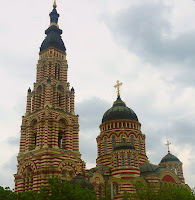Map time! Here we have southern Russia, western Kazakhstan, the Caucus region, and eastern Ukraine, where I live. As you can see, my little green arrow is dead in the centre of the pale yellow shape. That shape indicates the territory most heavily populated by Cossack hordes.
These nomadic horsemen once thrived in the rich steppe and river basins of this region. The Cossack people have disputed origins, but they are likely a blend of Turkish, Mongol, and Slavic peoples and gained prominence around the 15th century. They were semi-autonomous and integral to the Russian border defence for hundreds of years. However, with the mechanization of the first and second World Wars, the Cossacks (and cavalries in general) became obsolete.
No longer instrumental to the protection of the Soviet Union, the Cossack subculture fell on hard times. During the Bolshevik period and the subsequent famine, the state redistributed many of the crops grown in this region among urban centres. As a result, the Cossack population dwindled.
In recent times, Ukraine, Georgia, and even Putin's government have taken measures to increase protection of what few Cossacks remain, now mostly poor farmers or peasants. In eastern Ukraine, however, people identify closely to the Cossack heritage and keep it alive as their own. Festivals celebrating the culture, conquests, and music of the Cossack people are frequent and spirited. More than half of the collectives performing in our House of Culture are dedicated entirely to maintaining and performing Cossack folk songs.
I often hear from volunteers in western Ukraine the misconceived notion that only in their regions can you find culture and history. While it may be true that Lugansk lacks synagogues, castles, or cities older than 200 years, ours was a nomadic and oral history and is not to be discredited. It may not be as photogenic as the West, but we do have loads of this: I give you Казачья молитва, the Cossack's Prayer.












